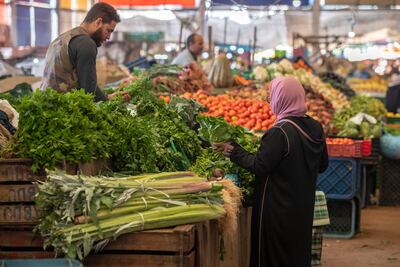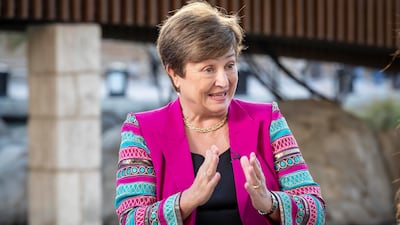About 90 per cent of advanced economies are projected to see a decline in their growth rate this year as higher interest rates, aimed at taming inflation, affect expansion, the International Monetary Fund's managing director said on Thursday.
"Economic activity is slowing in the United States and the Euro area, where higher interest rates weigh on demand," Kristalina Georgieva said during a speech in Washington ahead of the IMF-World Bank spring meetings next week.
The US, the world's largest economy, and the Euro area have continued to increase interest rates to fight rising inflation.
Last month, the US Federal Reserve increased the policy rate by 25 basis points as part of its push to bring inflation down to its target range of 2 per cent and restore price stability amid market turmoil fuelled by recent bank failures in the country.
This is the ninth rate increase by the US central bank since it started monetary tightening last March, pushing rates in the US to their highest since 2007, just before the 2008 financial crisis. The European Central Bank has also raised interest rates by 0.5 per cent.
In its January World Economic Outlook, the IMF raised its global economic growth estimate for this year by 0.2 percentage points to 2.9 per cent from its October forecast, a slowdown from 3.4 per cent in 2022.
It warned at the time that the financial environment remains “fragile” as the fight against inflation is not over and will continue to weigh on the global economy, along with Russia's war in Ukraine.
The fund expects the global economy to rebound to 3.1 per cent in 2024, below the historical average of 3.8 per cent over the 2000-2019 period.
“We project global growth to remain around 3 per cent over the next five years – our lowest medium-term growth forecast since 1990," Ms Georgieva said.
The per capita income growth in low-income countries is expected to stay below that of emerging economies as a result of higher borrowing costs and weakening demand for their exports, according to Ms Georgieva.
"That is a severe blow, making it even harder for low-income nations to catch up," she said.
"Poverty and hunger could further increase, a dangerous trend that was started by the Covid crisis."
The only bright spot is Asia, with India and China expected to account for half of global growth in 2023.
China, the world's second-largest economy, is estimated to have grown by 3 per cent in 2022. It is projected to grow by 5.2 per cent this year and 4.5 per cent next year.
India, which overtook the UK to become the world's fifth-largest economy in 2022, is expected to outpace the world's economies with a 6.1 per cent expansion in 2023 after growing 6.8 per cent last year. Its growth in 2024 is forecast at 6.8 per cent.
"With rising geopolitical tensions and still-high inflation, a robust recovery remains elusive. This harms the prospects of everyone, especially for the most vulnerable people and countries," Ms Georgieva said.
She called for strong policy action to climb "three big hills" to secure a recovery. These include fighting inflation and safeguarding financial stability, improving medium-term prospects for growth and fostering solidarity to reduce global disparities.

“So long as financial pressures remain limited, we expect central banks to stay the course in the fight against inflation," she said.
"At the same time, they should address financial stability risks when they emerge through appropriate provision of liquidity. The key is to carefully monitor risks in banks and non-bank financial institutions, as well as weaknesses in sectors such as commercial real estate."
Her comments come amid a banking crisis triggered by the collapse of Silicon Valley Bank and Signature Bank in the US and Switzerland's Credit Suisse, which resulted in the bank’s acquisition by larger rival UBS in an emergency rescue deal.
The IMF chief also said major "step changes" were needed to boost productivity with an emphasis on green energy.
“An estimated $1 trillion a year is needed for renewable energy alone. That will pay dividends in terms of growth and jobs."
International co-operation should also be enhanced to support growth.
“Our research shows that the long-term cost of trade fragmentation could be as high as 7 per cent of global GDP, roughly equivalent to the combined annual output of Germany and Japan. If technological decoupling is added, some countries could see losses of up to 12 per cent of GDP," she said.
The fragmentation of capital flows, including foreign direct investment, would be another hit to the prospects for global growth.
The IMF is boosting efforts to support countries in crisis, according to Ms Georgieva. The Washington based lender has provided nearly $300 billion in new financing for 96 countries since the start of the Covid-19 pandemic. These include Morocco, Sri Lanka and Ukraine, among others.
"I would like to make a double plea on [behalf of our weakest members], help them handle the burden of debt … and secondly, help ensure that the IMF continues to be in a position to support them," she said.
"We have increased our interest-free lending more than four-fold to $24 billion since the pandemic began. Now, we are urgently calling on our wealthier members to help address fundraising shortfalls."


